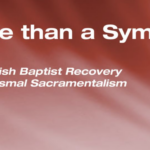Six months ago, I knew almost nothing about Francis Schaeffer besides his signature look: dressed like a hiker, with long hair and a goatee. His short book Escape from Reason was all I had read of him. From reading Colin Hanson’s biography of Tim Keller, I knew he was an influential Christian apologist with a unique ministry, L’Abri retreat and study center, but I had no first-hand knowledge of what made Schaeffer tick.
One day I saw Schaeffer on the Christian Life: Countercultural Spirituality by William Edgar on the shelf at the thrift store, in great condition for $3.99. At that price, it wasn’t hard to talk myself into buying it. I’m glad I did.
Francis Schaeffer was the founder of L’Abri and a key Christian apologist who defended the truth of the Christian faith during the postwar era. He made passionate and prophetic critiques of culture, especially concerning abortion and end-of-life care. Schaeffer could help Canadian believers defend the honour of human life in a country with no restrictions on abortion and a rapidly increasing number of deaths through MAiD.
Schaeffer was not shy about “co-belligerence” with folks who were not believers but aligned with him on certain social issues. Some of which has led to his writings being used to support Theonomy although Edgar says he is not a Theonomist (159).[i] His lasting impact, though, is not his arguments for God’s existence, or even his cultural critiques, but his emphasis on true spirituality: every sphere of a Christian’s life is wholly devoted to Jesus. Every moment is shaped by the reality of the God who is there.
My introduction to Francis Schaeffer, gave me an appreciation for three emphases of his spirituality: a theological, a pastoral, and a personal emphasis which I will reflect on in turn.
A Theological Emphasis: All of Life Before God
Schaeffer was driven by the theological conviction that God is, that God is there. The reality of God has dramatic implications for all of life in the present. His convictions were not formed in a tidy manner. He experienced a crisis of faith in 1951-1952, forcing him to reevaluate his world and life view. The conviction of his ministry until then was “to stand for the historic Christian position, and for the purity of the church” (81). Then came his crisis which he describes like this:
Gradually, however, a problem came to me- the problem of reality. This had two parts: first, it seemed to me that among many of those who held the orthodox position, one saw little reality in the things that the Bible so clearly says should be the result of Christianity. Second, it gradually grew on me that my own reality was less than it had been in the early days after I had become a Christian. I realized that in honesty I had to go back and rethink my position (83).
One aspect stands out in his confession. Schaeffer was convinced that if Christianity were true, it must be true for all of life. He was part of denominational splits during the fundamentalist-modernist controversy, but years later saw a disconnect in “those who held the orthodox position” on inspiration and inerrancy. Right belief didn’t seem to translate to Christ-like love, or whole self-surrender to Jesus. He wasn’t just pointing the finger at others though; he saw this same disconnect in himself. He told his wife, Edith:
I really feel torn to pieces by the lack of reality, the lack of seeing the results the Bible talks about, which should be seen in the Lord’s people. I’m not only talking about people I’m working with… I’m not satisfied with myself. It seems that the only honest thing to do is rethink, reexamine the whole matter of Christianity. Is it true? (82)
If Christianity is true, all life is lived before God and in submission to Jesus. When Schaeffer didn’t see what the bible said is the fruit of genuine faith in Jesus, he honestly questioned his faith.
I appreciate his honesty and his principles. The theological realities of God, sin, and salvation in Christ have a “present meaning” for every sphere of our lives (83). Paul says, “I have been crucified with Christ, and I no longer live, but Christ lives in me” (Gal 2:20). All of me is crucified with Christ and raised to live for Christ. When he saw a serious disconnect between the theology evangelicals confessed and the way they treated each other, Schaeffer went back to page one and re-examined Christianity. Schaeffer emerged from his crisis assured of the Christian truth claim, but realistic about the slow progress of sanctification.
Bruce Ashford notes, “Intellectually, Schaeffer presented Christianity as an all-encompassing world-and-life-view that outstripped all other such views.”[ii] The all-encompassing world-and-life-view of biblical Christianity grounds Schaeffer’s apologetics and spirituality.
This is a message we need today. It is all too easy for Christians to separate their spiritual lives from their secular lives, as though the Bible and the church have nothing to do with our business, family, or art. We can even appear to justify sin for the sake of “co-belligerence” on serious issues like abortion. Schaeffer would not accept this division as biblical (154). Edgar explains, “he would never want a human being to be divided into a spiritual and a secular self” (186). Since Jesus is Lord of all, you are a Christian in every sphere of life.
A Pastoral Emphasis: Conversation
Edgar opens Schaeffer of the Christian Life with a personal reflection, followed by two brief chapters of biography. These chapters reveal Schaeffer’s pastoral-like care and genuine love for people. Two words come to mind: hospitality and conversation. Honest questions, thoughtful answers, over shared meals and long walks.
Edgar shares the story of the first one-on-one conversation he had with Shaeffer. Having been asked to bring one question to discuss, he says:
So then the moment arrived. I made my way upstairs to the little chamber outside the bedrooms where Francis Schaeffer liked to counsel people. With that same profound face, its warm grin and the clear sense that he really cared about me as well as the issues we needed to discuss, he asked whether I had thought of my question. I spouted out my question about relevance, and he came back with an extensive, thoughtful reply.
L’Abri’s legacy of hospitality is seen in the testimonies about Schaeffer. The sense of “genuine care” Edgar mentions seems to be shared by everyone who went there, whether Christian or Atheist, healthy or sick, wealthy or poor. Schaeffer showed genuine care by valuing conversation. His daughter Priscilla said, “There wasn’t anybody I couldn’t bring home, no matter how eccentric, how rebellious, how blasphemous.… I didn’t have to be ashamed.”[iii]
How often do we overlook the value of simple, thoughtful conversation? Today we build relationships online and engage through memes, texts, and sound bites. As a pastor, I tend to give more weight to my sermons and vision planning when I think about how to minister to people. But looking someone in the eyes, taking their questions seriously and giving them our time, not as though it’s a burden, but a joy, is a better path of care and love. Schaeffer’s model of genuine love grown and shown in thoughtful conversation, is one I need, and one many of us need today.
A Personal Emphasis: Evangelical Piety
We’ve seen how Schaeffer’s crisis of faith in the early 1950s was triggered by a disconnect between doctrine and piety in evangelicalism and himself. Coming out of this crisis his prophetic message called for consistency between what we confess and how we live. Jesus is not just insurance for the future; our present reality is radically reformed in him.
Schaeffer says “Reality is not meant to be only creedal, though creeds are important. Reality is to be experienced on the basis of a restored relationship with God through the finished work of the Lord Jesus Christ on the cross” (94). For Schaeffer, our being created in the image of God was a crucial category for understanding and applying our life in Christ (88-89). Following Jesus meant fulfilling the purpose of being a creature made in God’s image. Schaeffer says, “I am a Christian, but not only a Christian. I am also the creature, the one who has been created; the one who is not autonomous, dealing with these other things that equally are not autonomous. As a Christian, I am consciously to deal with every other created thing with integrity, each thing in its proper sphere by creation” (182). His critiques of culture aimed at restoring the dignity of human beings discarded by the rejection a biblical worldview (186-187).
His piety was thicker than a set of disciplines. It included each aspect of our being, equipping believers to engage the culture in transformative ways. His holistic view provided a Christian way to think about art, science, family, law, psychedelics, business, race and other crucial issues (180-186). I think he can overstate the connection between gospel revival and cultural reformation. Nevertheless, his affirmation of the goodness of creation and our agency in renewing culture through honouring and enjoying this goodness is a helpful corrective against the pessimism and hopelessness I’ve heard from many Christians. It’s pushed me to reflect more on what Paul says in 1 Timothy 4:4-5 “For everything created by God is good, and nothing is to be rejected if it is received with thanksgiving, since it is sanctified by the word of God and by prayer.” God’s good creation, corrupted by sin, sanctified by the word of God and the prayer of believers.
The Christian life is not a checklist of Christian stuff. It is a life of complete and joyful surrender to Jesus, which sanctifies everything around us.
My brief introduction to Schaeffer through Edgar’s book was enriching and insightful. Christians could find value in learning from someone described by Os Guinness as a man, “who took God so passionately seriously, people so passionately seriously, and truth so passionately seriously” (190).
[i] Commenting on Schaeffer’s connection to the Religious Right Edgar says, “Out of concern, I did discuss his allegiances with the Religious Right openly with him. He was predictably articulate in explaining that he could be ‘cobelligerent’ with all kinds of people without being their ‘allies.’ And even though he admired the Moral Majority for its stand on freedom and the rule of law, Schaeffer was not in any way a patsy to the leaders of the evangelical right” (76).
[ii] Bruce Riley Ashford, Every Square Inch: An Introduction to Cultural Engagement for Christians (Bellingham, WA: Lexham Press, 2015), 59.
[iii] Ashford, Every Square Inch, 59.
























